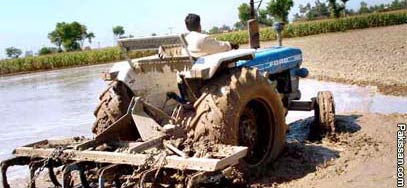|
Wheat sowing may be delayed in Punjab
By Ahmad Fraz Khan
 AS
Punjab is focused on the cotton crop, and justifiably so,
wheat sowing in the province might get delayed beyond
prudent limits. AS
Punjab is focused on the cotton crop, and justifiably so,
wheat sowing in the province might get delayed beyond
prudent limits.
At present, the entire attention of the Punjab Agriculture
Department is riveted on saving cotton. It is still issuing
repeated advisories to farmers for application of fertiliser.
Cotton crop takes at lest 60 days to mature after the
application of fertiliser. That means the crop would mature
in the second week of November – the most propitious time
for wheat sowing. Its picking would take another 10 to 15
days, and then
soil preparation for wheat another week or so. The sowing
might thus be delayed till mid- and even late-December,
which, by no means, is desirable: after November 20, each
day costs the farmer about 10 kilograms in yield.
The factors forcing Punjab to save cotton as much as it can
are truly compelling. The loss of every million bales
deprives the rural economy of around Rs32 billion,
increasing poverty correspondingly. It forces the textile
industry to import the
same quantity at the cost of very precious foreign exchange.
Since 60 per cent of exports depend on cotton, it is wise to
save it to the last boll.
To top it all, the farmers have done the hard work. They
have nurtured the crop for many months and made huge
investments on sowing, fertilisation and pesticides. They
deserve return on their investment, and that is what the
Punjab government
is struggling for.
But, the provincial government also needs to ensure that
food safety is not compromised next year. The huge
carry-over stocks (about six million tons at present) do
provide it huge space for manoeuvering. But it maintained
the stocks at a
massive cost – around Rs2.5 billion in per month interest
payments to banks on a loan of over Rs200 billion.
If it has to carry those stocks for next year’s food safety,
it is asking for huge financial trouble. It would thus be
prudent to clear those stocks this year, and plan a better
crop next year. Allowing, rather planning, delay in wheat
sowing only
because of substantial stocks would be a risky proposition.
Another pressure that wheat crop might face this year is
“uncertain subsidy package” for the flood-hit farmers.
Though the Punjab government is preparing an elaborate
package for farmers, which includes money for soil
preparation, seed and
even fertiliser, it is yet to find a donor for the money.
The ambitious package would cost the provincial government
around Rs10 billion – an amount that it neither has nor can
generate from its own sources. The donor is hard to find.
The provincial government has already raised expectation by
repeating range and depth of package for political mileage.
If it could not find a donor in the next two to three weeks,
it would end up compromising on the package, which might hit
the crop – at least in flood-effected areas. It has already
restricted the package to flood-hit areas alone, excluding
rain-effected areas. Any further, especially financial,
restriction will affect wheat production next year.
There are signs that wheat acreage might improve this year
for a simple reason that farmers consider it the easiest
crop and a sure investment, with almost ensured buyback
surety by the government. It might be true that farmers in
the flood-hit
areas would avoid risking any new crop like canola – as
being advocated by the federal government.
Rabi crops like potato, gram and cane might suffer to some
extent in the flood-hit areas. The flood waters must have
also increased fertility of the soil, which might help wheat
crop to a large extent. Residual soil moisture would also be
beneficial
for the wheat crop, and it being a monocot crop might also
escape other water problem like crust formation.
The cooling down of temperatures in the country, especially
during night, would help wheat grow efficiently. All these
factors should make the wheat crop most favourite this
season.
But it still needs official patronage, which is currently
drifting away from it – temporarily at least.
The province was able to grow around 18 million tons of
wheat only when the Punjab government launched one billion
rupees wheat maximisation programme, and literally focused
all its financial, human and infrastructural resources on
it.
For the last two years, it has not only abolished the plan,
but also was “relatively ignoring” the crop because of huge
stocks that it could not clear from the 2007-08 yield. It
reduced production last year by at least two million tons.
There is still an uncertainty about the next crop, which is
about availability of seed. Most of the farmers in flood-hit
areas have lost seed. The food department does not separate
wheat on the basis of seed. It just dumps everything
together, and
no one would know which seed will lead to what.
The Punjab government is trying to involve federal seed
institution to ensure “germination strength” of wheat, which
the provincial food department would be providing as seed
from its stocks. How these old and fumigated stocks, to be
used as
seed, would behave, no one knows at present.
The government must realise that if there are benefits in
saving cotton, there is some cost involved in delaying wheat
sowing. If there are good signs for wheat crop, there are
also question marks that make it uncertain. By adopting a
strategy of
“planning a delay” in wheat sowing, the provincial
government would only elongate the list of uncertainties.
Both crops are vital for the country, and the government
must try to find a balance for the benefit of both crops.
Courtesy: The DAWN
|
Pakissan.com;
|